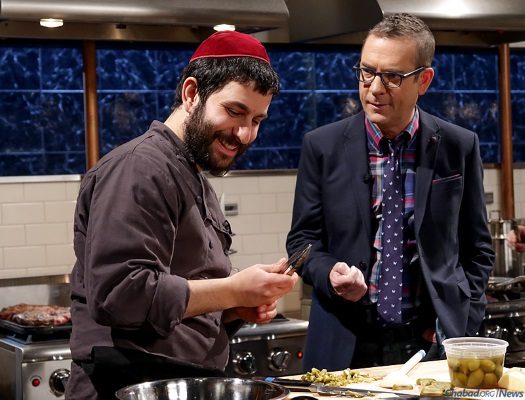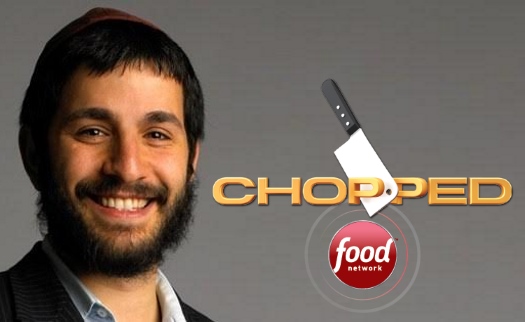
Rabbi Takes Second in ‘Chopped’
by Reuvena Leah Grodnitzky – Chabad.org
He wore a winning smile the entire time, even though he didn’t come away with first place and the $10,000 cash prize.
Rabbi Hanoch Hecht, 31, co-director of Chabad Dutchess-Rhinebeck Jewish Center in Upstate New York with his wife, Tzivie, recently participated as a contestant on the popular Food Network show “Chopped.” In an episode titled “Leap of Faith,” he competed alongside three other clerics—a priest, a pastor and a nun—to prepare an appetizer, entree and dessert using secret basket ingredients revealed at the beginning of each round. The rounds were timed in increments of 20 minutes, 30 minutes and another 30 minutes, respectively.
The show (Season 28, Episode 13) aired on June 21 and will be rebroadcast on the Food Network. It’s also available on demand.
“The experience was phenomenal,” said Hecht, who had never seen the program prior to his involvement. “The producers were very accommodating and sensitive to my needs and requirements.”
Unlike the three other competitors, Hecht’s culinary participation was contingent on adherence to the Jewish dietary laws of kashrut. In fact, it was these laws that brought him to the show in the first place. From the time he moved to Rhinebeck 10 years ago, Hecht has served as a guest lecturer at the Culinary Institute of America (CIA) in Hyde Park, N.Y., teaching students the biblical, rabbinic and practical aspects of kosher cooking for their futures as chefs, bakers and other related careers in the food industry.
Even though Hecht’s lectures only teach about food rather than actually prepare it, it was one of the CIA’s professional chefs that nominated him to appear on the popular “Chopped” program.
“I’ve always enjoyed cooking, but I’m by no means professional,” says the rabbi. “So before I appeared on the show, some of the chefs at CIA coached me and gave me lessons, sort of as a way of reciprocating the favor for my lecturing during these past years.”
In the laws of kashrut, however, Hecht is certainly well-versed.
“Being on this show emphasized to me how no other religion requires both the ingredients and food preparation to be within certain guidelines,” he explains. “The other contestants didn’t have the same restrictions that I had. The experience helped me to appreciate even more the responsibility and reward of keeping kosher.”
‘We Have G‑d in Common’
Throughout the cooking contest, Hecht peppered his comments with Yiddishterms, and even sang some lines from “Hava Negila” and “Hevenu Shalom Aleichem.” Most challenging for him was the fact that since the show’s kitchen was not kosher, he could not taste any of the food, at several points asking the pastor to sample the condiment levels in his culinary creations.
His first course—a salmon stew appetizer that included raw white honey andEzekiel bread, a product containing millet, spelt, barley and wheat—was well-received by the judges. His entree, a Lebanese-style lamb-and-rice dish, was more uneven, though a jalapeño-based relish called “the rabbi’s heat” (often served at Shabbat and holiday meals, says Hecht) proved a hit. His most successful item of the day was dessert; from scratch, he made rugelach with a fig, macadamia nut and hamantash filling (hamantaschen being a basket ingredient), alongside a rainbow carrot tzimmes and fresh whipped cream—all nondairy since meat was served beforehand.
On the show, Hecht described the competition as “fierce,” even though a great deal of congeniality was exhibited among the competitors, with SisterSara Marks noting that “we all come from different faith backgrounds and different experiences, and yet we all have G‑d in common.”
The judges were chefs and restaurateurs Alex Guarnaschelli, Marc Murphy and Geoffrey Zakarian.
As for interacting with the show’s host—cookbook author and longtime “foodie” Ted Allen—the rabbi replies that he was impressed by his Yiddish vernacular, and that Allen was “very respectful to kashrut.”
Home Cooking
Growing up in Brooklyn, N.Y., as one of 10 children, Hecht enjoyed helping his mother in the kitchen.
“It was a way of staying in my mother’s good graces and a practical way to help her,” he says with a laugh, “though she may not have appreciated it as much as I did because I probably didn’t clean up the mess I made when I was ‘helping’ her.”
In his own home in Rhinebeck—two hours north of New York City along the Hudson River—Hecht participates in the cooking for Shabbat and the holidays. His wife, Tzivie, plans the menus, and he makes sure to whip up a dish or two himself.
“From a spiritual perspective, the more preparation we have for Shabbat or holidays, the higher that it will be elevated to holiness,” says Hecht.
The cooking styles of the couple, who have five children, tend to balance each other out: The rabbi likes a lot of spice, while Tzivie prepares milder foods.
“I enjoy cooking fish dishes the most,” offers Hecht. “Though specifically not gefilte fish—not that there’s anything wrong with gefilte.”
For Hecht, participating in “Chopped” was more about education, rather than competition.
“I never had a great desire to compete. Instead, I saw the show as an opportunity to discuss the laws of kosher with millions of viewers,” he explains. “Eating kosher is a fundamental part of being Jewish, so I hope that the show will debunk some myths about kosher food and inspire Jews to learn more about it.”
If the rabbi—who comes from a long line of rabbis—had garnered first place, he was planning to donate the money to a charity established by his grandfather: the nondenominational Toys for Hospitalized Children.
“I did win,” he says at the end of the show. “The fact that I got to compete, the fact that I represented kosher in a dignified manner . . . I hope I made a true Kiddish Hashem, a true sanctification of G‑d’s name. So from that perspective, I did win.”














cook
I had never seen the show but I just watched it online. It was a fair result, but Chanoch Hecht definitely has some skills & for not being a baker, his dessert was fantastic.
But I felt there was too much showmanship, Jewish cliches & generally, it was very irritating especially in the first round. I think he toned it down afterwards. Still, it was a kiddush Hashem as he wanted and he should be very proud.
Anonymous
To the non drum it was probably exactly what they like to see!
Chanochi is still a winner!
I think Chanochi should have won…but, I couldn’t imagine theyd let an orthodox rabbi win.
anti Semitism still exists…as do self hating Jews (for anyone who will say that those involved with the show are Jewish themselves)
SERIOUSLY???
Honestly, some of the tribe are so kleinerkeppledik. Antisemitism – over a cooking show? You really are nuts.
DeClasse' Intellectual
Unless you have been in the kitchen under time pressure often with ingredients that are not common or unusual, hold your tongues. considering all he could have done and the restrictions he was under, Rabbi Hecht did a great job and as he stated it showed that kosher was possible under even adverse circumstances and people exist beautifully even in competition when there is mutual respect for each other.